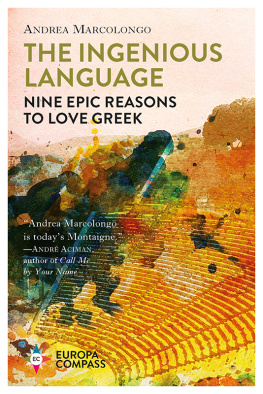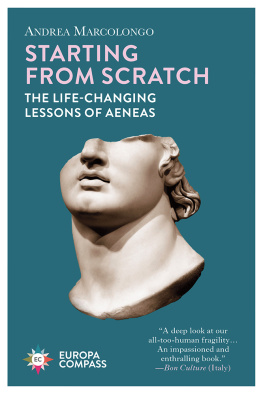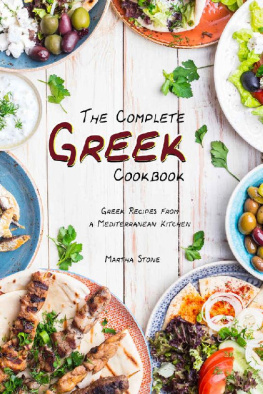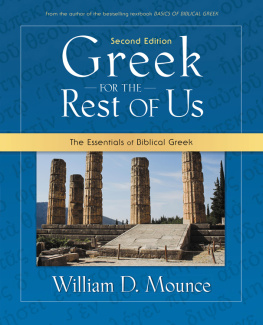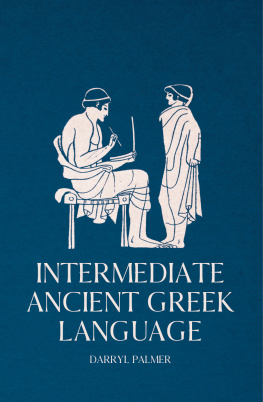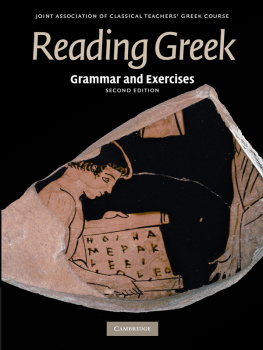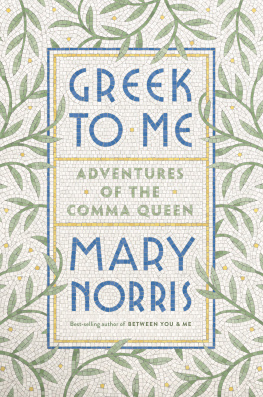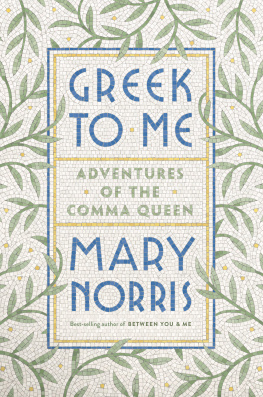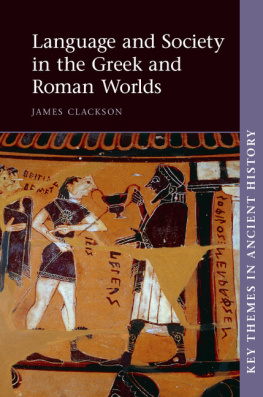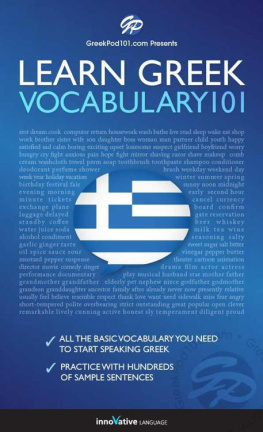THE INGENIOUS
LANGUAGE
For Livorno,
for Sarajevo,
for me
I NTRODUCTION
The sea burns the masks;
the salt sets them on fire.
Men and all their masks
blaze up on the shore.
You alone will outlive
the conflagration of Carnival.
You alone, unmasked, conceal
the art by which we live.
G IORGIO C APRONI , from Chronicle
It is strangevery strangewrites Virginia Woolf, that we should wish to know Greek, try to know Greek, feel for ever drawn back to Greek, and be for ever making up some notion of the meaning of Greek, though from what incongruous odds and ends, with what slight resemblance to the real meaning of Greek, who shall say. Strange because in our ignorance we should be at the bottom of any class of schoolboys, since we do not know how the words sounded, or where precisely we ought to laugh.
Im strange toovery strange.
And Im grateful for that strangeness, which has led me to write this book about ancient Greek, having had no plan toand no plan is always the best plan. I pushed myself not only to increase my knowledge of Greek, but also to talk about it.
To you. From the bottom of the class (naturally) to this; but at least now I have an idea about where precisely we ought to laugh.
Dead language and living language.
Bane of high-school students and adventures of Ulysses.
Translation and hieroglyph.
Comedy and tragedy.
Understanding and misunderstanding.
Most of all, love and hate.
Revolt, then.
Coming to understand Greek is like learning how to live your life: not a question of talent but of determination.
I have written these pages because I fell in love with Greek when I was a young girl. That makes it the longest romance of my life, when all is said and done.
Now that I am a grown woman, I would like to try to kindle (or rekindle) the romance in those who fell out of love with it, in all those who encountered this language foradults when they were justkids in a classroom. Id even like to make sparks fly in those who have no previous knowledge of the language.
This book is about love: love for a language and, more importantly, for the human beings who speak it. Or, if no one speaks it anymore, for those who study it either because they are forced to or because they find themselves irresistibly drawn to it.
It does not matter if you know ancient Greek or not. There are no exams or pop quizzes attached to this book, though there are surprises. Loads of them.
Nor does it matter whether you studied the classics in school. All the better if you didnt. Should I succeed in guiding you through the labyrinth of Greek on the wings of my imagination, youll arrive at the end of this journey with new ways of thinking about the world and your lifewhatever language you use to articulate them.
If you did study it, even better. Should I manage to answer the questions youve never asked or that you never had answered, maybe when youre done reading this youll have recovered parts of yourself that you lost growing up and studying Greek without really understanding why, and maybe those parts will turn out to be useful to you now.
In either case, these pages are a way for you and me to take a crack at thinking in ancient Greek.
Over the course of our lives, all of us encounter Greek and the Greeks at one time or another. Some of us with our legs tucked under a school desk, others while watching a tragedy or comedy unfold at the theater, others still in the cool white corridors of the worlds many museumsin each case, what it actually meant to be Greek is no more vivid and alive to us than a marble statue.
Sooner or later, each one of us is told, Everything beautiful and unparalleled that has been said or done in the world was said or done by the ancient Greeks first. And, therefore, said or done in ancient Greek. Told may be the wrong word, since, at least if you grew up anywhere in Europe, for more than two millennia this idea has been embedded under our skin and in our minds.
Almost no one has direct knowledge of ancient Greek; the one thing we can be certain of is that there are no more ancient Greeks who speak ancient Greek. We have only heard that it was spoken and never heard the language itself. Thats how things have stood for centuries.
Meaning, this apparent Greek cultural inheritance has been generously handed down to us by an ancient race that we dont understand in an ancient language we dont understand.
How extraordinary.
It is terrible to be told you must love a subject that you dont understand; you immediately hate the subject.
The sight of the Parthenon marbles or the Greek Theater of Syracuse fills us with pride, as if these ancient Greek relics were the work of our ancestors, of our distant great-great-great grandparents. We like to imagine them under the sun on some island, busy inventing philosophy or history, or attending a tragedy or comedy at a theater on the side of a hill, or admiring the starry sky at night and discovering science and astronomy.
Yet deep down we always feel like were on shaky ground, as if we were being tested on something quite foreign to us, as if we had forgotten some important chapter on ancient Greece. And that chapter that now seems foreign to us is the Greek language.
A Greek, writes Nikos Dimou in all his unhappy glory, a strange, absurd, tragic moment in the history of humanity.
Not only do we approach our ancient Greek cultural inheritance as a dispossessed, ill-equipped people, but if we try to claim a shred of what Greekness has handed down to us, we become victims of a backwards and obtuse education system (in my bottom of the class opinion, which, after this book, might earn me an F and expulsion).
The classics, at least as theyre taught in Italy, appear to have no other goal than to keep the Greeks and their Greek as inaccessible as possible, high up on Olympus, mute, glorious, and clouded by a reverential awe that often turns into divine terror and very earthly desperation.
Current teaching methods, with the exception of those practiced by a handful of enlightened teachers, guarantee that anyone who dares to approach Greek will hate the language rather than love it. The result is total surrender before a heritage that we no longer want to know, because as soon as we bump up against it, our confusion has us running for our lives. Most of us set fire to the ships behind us as soon as weve fulfilled our course requirements.
Many readers will shudder to recall their fear and exertion, their anger and frustration with ancient Greek, and recognize their own struggles in mine. Yet this book was written with the conviction that it makes no sense to know something that you dont remember, especially after five-plus years of sweat and tears.
This book is not, therefore, your conventional guide to ancient Greek. It is neither descriptive nor prescriptive. It makes no claims to be academic (that breed of book has been around for millennia).
Sure, it does demand passion and a willingness to be challenged. Its a literary (not literal) tale about a few particular aspects of the magnificent and elegant ancient Greek languageits concise, explosive, ironic, open-ended modes of expression, whichlets be honestwe unconsciously pine for.
Whatever youve been told (and more importantly not told), ancient Greek is first and foremost a language.
Every language, and every word of that language, functions to paint a world. And that world is your own. It is thanks to language that you can formulate an idea, give voice to a feeling, communicate how youre doing, express a desire, listen to a song, write a poem.
In an age where were all connected to some

